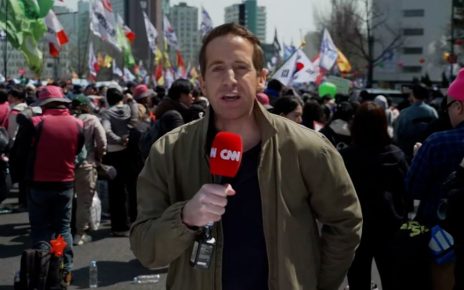Fox News host Laura Ingraham recently referred to Rep. Jasmine Crockett (D-Texas) as “street” while criticizing the congresswoman’s remarks about Attorney General Pam Bondi.
During a Wednesday segment of “The Ingraham Angle,” Ingraham and Fox News contributor Raymond Arroyo each took jabs at the representative as they discussed her comments at a House Judiciary Committee hearing earlier that day, in which Crockett accused Bondi of attacking her right to free speech. (Bondi had previously told Crockett to “tread very carefully” when it comes to her criticisms of Elon Musk — and Crockett wasn’t having it.)
Arroyo unabashedly labeled Crockett, who is Black, the “Madea of Capitol Hill” — seemingly a reference to filmmaker Tyler Perry’s famous boisterous Southern character, who is also Black. He also referred to Crockett as a “Desperate Housewife.”
Ingraham then said that the congresswoman had communicated in a “very different” way with her during a past interview.
“And now she’s going very … street,” Ingraham said as she swayed her head side-to-side. “I’ma do this, and I’ma do — it all seems like just a TikTok challenge or something. It’s very odd.”
People have long labeled Black people with anti-Black coded terms like “street” or “ghetto” when the intention is to express something unpleasant — regardless of the target’s socioeconomic class. Those labels are also often used in a classist way to suggest that people living in poverty-stricken areas are inferior and violent, among other stereotypes.
As Jared Blake, senior producer at MSNBC, said in 2023, the term “ghetto” is often “used to describe something that is of lesser worth.”
And the problem with coded terms — like the word “ghetto” — is that
“it’s very difficult to disassociate it from its use to characterize low-income African Americans,” Mario Luis Small, professor of social science at Columbia University, told BBC News in 2016. “Thus, when ‘ghetto’ is used as an insult, it often sounds like a racial insult.”
People on X, formerly Twitter, have slammed Ingraham and Arroyo’s remarks since the segment aired.
“The moment they can’t find a good excuse, they start being racist,” one X user wrote.
“This was filled with so much racial undertones. For a party that hates identity politics it’s always the first thing they go to,” wrote another.
Tabitha Bonilla, an associate professor of political science and human development and social policy at Northwestern University, told HuffPost that she thinks it’s disappointing that so much public dialogue — like Arroyo and Ingraham’s Fox News segment — has “decreased in substance,” but has increasingly invoked more “discriminatory and demeaning language.”
She said that she agrees with those online critiquing Ingraham and Arroyo, adding that their choice to label Crockett as “street” and to reference Perry’s Madea character “feels overtly racist.”
“Dog whistles tend to be subtle — you only understand them if you know what to listen for,” she said, pointing out that the comedic Madea character is meant to be laughed at and not taken seriously.
These are “not subtle references,” Bonilla said, adding that their conversation about Crockett’s remarks also felt dismissive.
“There is no question in my mind that Ingraham and Arroyo are inciting racial stereotypes in their characterizations of Crockett,” said Deepak Sarma, Inaugural Distinguished Scholar in the Public Humanities at Case Western Reserve University.
“In so doing they are, quite obviously, stoking the fears of their (already biased) viewers,” they continued. “I am not surprised and it is similar to the rhetoric put forth by [President Donald] Trump to dehumanize people who are not ‘white.’”
Sarmalater added: “Using words like ‘street’ is akin to calling her a thug. Ironically, when GOP members such as Lauren Boebert and Marjorie Taylor Greene speak in derogatory ways they are always excused and often lauded.”
Many of Crockett’s critics appear threatened by the way she speaks — and her presence overall, experts say.
Crockett is often ridiculed for the way she speaks. Many of her most ardent critics online spew inflammatory remarks — usually rooted in anti-Black stereotypes — about her cadence or her use of African American Vernacular English (AAVE) by calling her names like “ghetto queen” or “hood rat.”
Others have made attempts to argue that Crockett is disingenuous because the way she speaks doesn’t align with their views of how a member of Congress or someone who attended private school should speak.
Crockett herself addressed some of these attacks in a TikTok video last month, saying it’s absurd that her critics have said her so-called “accent” is “fake” because she went to private school.
“I don’t have an ‘accent’ … if anything it’s Texan, maybe mixed with a little bit of St. Louis,” she said. “And then determining that my ‘accent’ is fake because of the types of schools I went to … seriously, y’all?”
The congresswoman said that the outrage over how she speaks proves that there are no real issues her critics could dig up about her.
“By focusing on her expressions they are exemplifying just how deeply entrenched their historically dominant language game, which, is being threatened,” Sarma said about those criticizing the way Crockett speaks.
“Crockett’s critics are offended by her very existence, and her language is just one part of this,” they later continued. “The rise of MAGA and Trump have revealed that many Americans continue to see Black people as second-class citizens. Blacks in public and prominent positions threaten these derogatory stereotypes.”
Sarma pointed out that former President Barack Obama was often scrutinized for his “skill at code-switching.”
Bonilla said that there’s been a “larger trend” within the Trump administration and with many in conservative media to “invoke tropes and belittle the people who disagree with them rather than engaging with the substance of the disagreement.”
“This is obviously bad for a society that wants to enforce norms of civil discourse and racial equality in speech, but it is also a terrible sign for [the] health of our democracy,” she continued.




